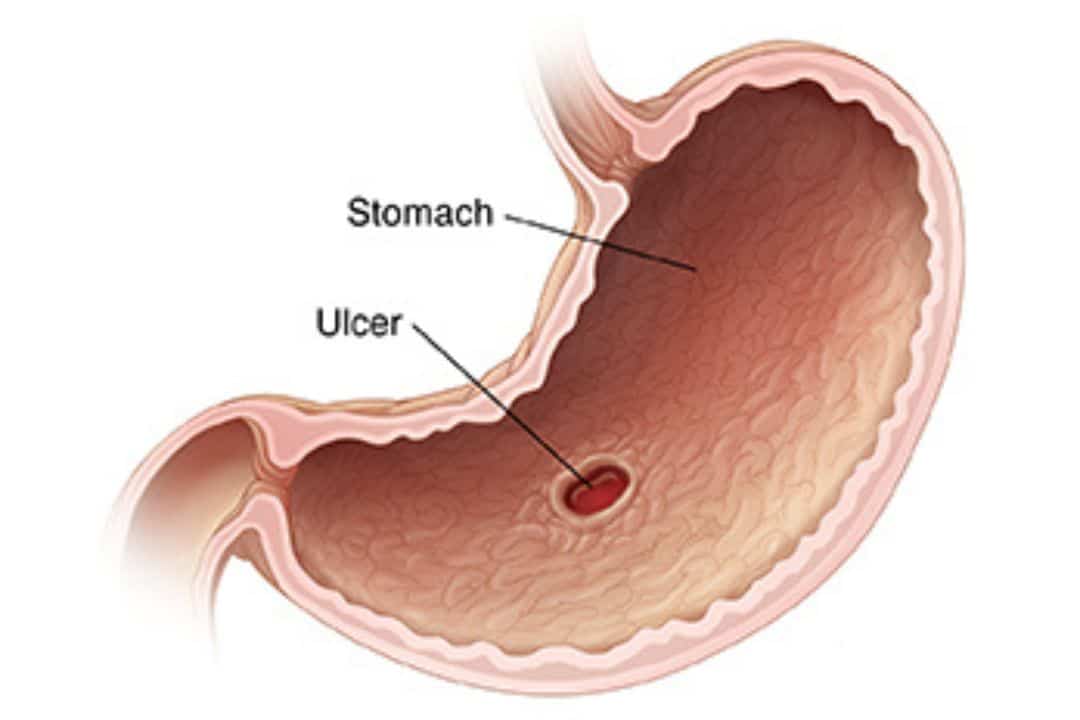Gastric Ulcer
Gastric Ulcer, also known as peptic ulcer, is a localized area of erosion in the stomach lining, resulting in abdominal pain, possible bleeding, and other gastrointestinal symptoms. The most common cause of gastric ulcer is a stomach infection associated with the Helicobacter pylori (H. pylori) bacteria.
Gastric ulcers are painful sores that develop on the inner lining of the stomach. These ulcers occur when the stomach's protective mucous layer is weakened, allowing stomach acid to erode the lining. Gastric ulcers can lead to significant discomfort and may affect digestion and overall well-being. In addition to bacterial infections like H. pylori, long-term use of nonsteroidal anti-inflammatory drugs (NSAIDs), such as aspirin and ibuprofen, can also contribute to the development of gastric ulcers. Stress and spicy foods, while not direct causes, can aggravate existing ulcers.

Symptoms of Gastric Ulcer
Symptoms of gastric ulcers can vary depending on the severity of the condition. Some individuals may experience mild symptoms, while others may face more serious complications, such as bleeding ulcers. Common symptoms include:
Abdominal Pain
A burning or gnawing pain in the stomach, often worsening when the stomach is empty or at night.
Bloating and Belching
Frequent belching and a sensation of fullness in the stomach.
Indigestion
Discomfort after eating, accompanied by nausea or bloating.
Loss of Appetite
Reduced desire to eat, sometimes leading to unintended weight loss.
Vomiting
In some cases, vomiting may occur, and it can be severe if the ulcer is bleeding.
Black or Bloody Stools
This indicates internal bleeding from the ulcer and requires immediate medical attention.
Heartburn
A burning sensation in the chest or upper abdomen, often mistaken for acid reflux.
If left untreated, gastric ulcers can lead to complications such as perforation of the stomach wall, bleeding, and obstruction of food passing through the digestive tract.
Gastric Ulcer Treatment
The goal of treatment is to reduce symptoms, heal the ulcer, and prevent complications. Our treatment options include:
Antibiotic Therapy
For ulcers caused by H. pylori infection, a combination of antibiotics is prescribed to eradicate the bacteria and promote healing.
Proton Pump Inhibitors (PPIs)
These medications help reduce stomach acid production, allowing the ulcer to heal and preventing further damage to the stomach lining.
H2-Receptor Antagonists
These drugs decrease acid production and are used in cases where PPIs may not be suitable.
Antacids
These over-the-counter medications can help neutralize stomach acid and provide rapid relief from pain and discomfort.
Lifestyle Modifications
Patients are advised to avoid NSAIDs, limit spicy foods, stop smoking, and reduce alcohol intake to prevent aggravating the ulcer.
Dietary Adjustments
A healthy, balanced diet that avoids triggers like caffeine and fatty foods can support the healing process.
Services :
Dr. Vishavnoor Singh Kalra provides best Gastroenterology services.He has best experise in all the fields of colonoscopy, endoscopy, and therapeutic Endoscopy procedures like ERCP and EUR. He has vast experience in specialised care for the prevention, diagnosis, and treatment of diseases of the liver and the digestive tract, including the stomach, gallbladder, duodenum, biliary tract, small intestine, pancreas and colon. Our dedicated team offers expertise in general gastroenterology as well as: gastrointestinal cancers, liver implants, inflammatory bowel disease and viral hepatitis.
He strive to offer patients thoughtful, compassionate and timely care through the most advanced procedures like photodynamic therapy and endoscopic techniques. Our state-of-art operation theatres, equipped with dedicated medical and surgical intensive care units, allow our surgeons to perform all minor and major surgeries related to Gastroenterology and Liver Diseases.







